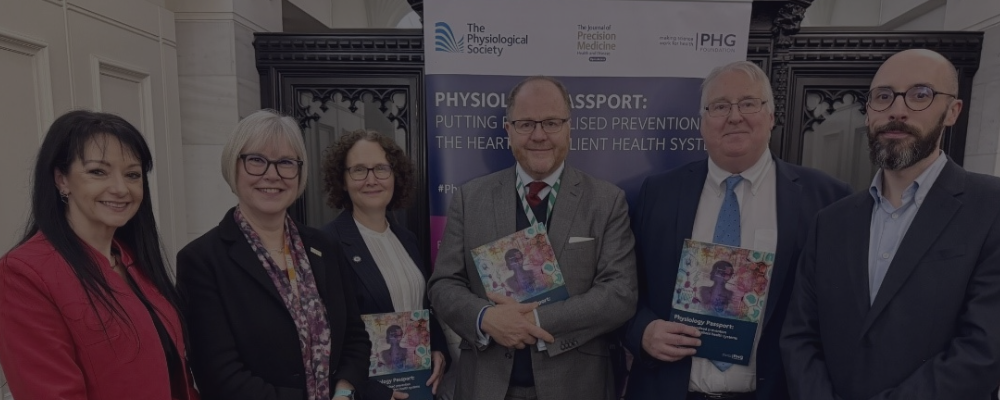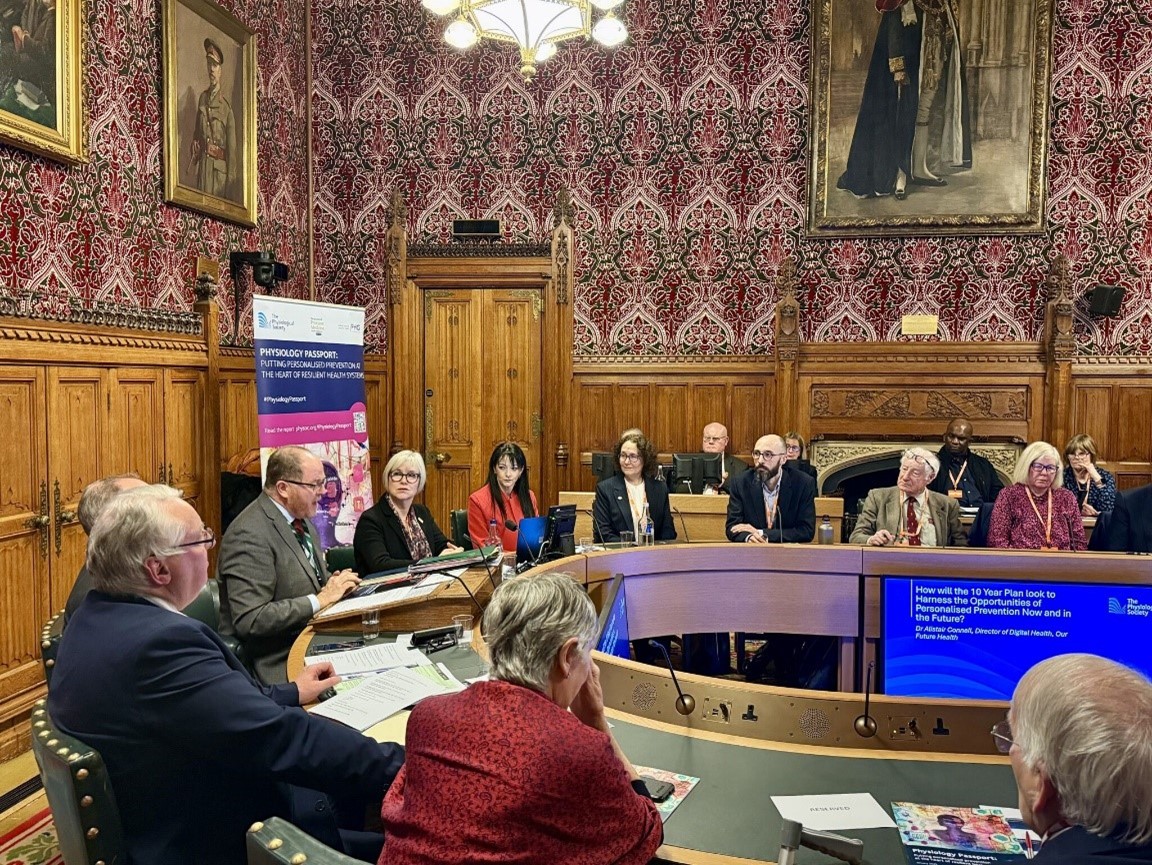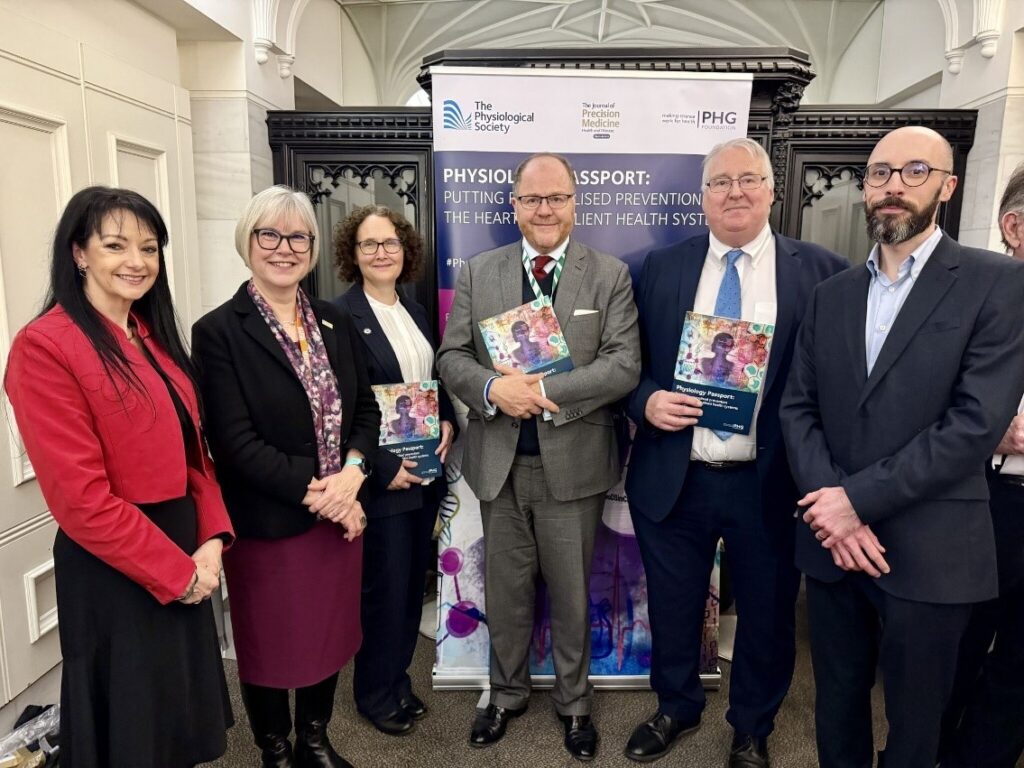
How can precision prevention reduce the demand on the UK health system?
By Shania Pande, Policy Officer, The Physiological Society
Dr Laura Blackburn, Head of Science, PHG Foundation
Professor Dame Melanie Welham, Former Executive Chair, BBSRC (Chair of the Physiology Passport Steering Group)
Setting the Scene
It has been well documented, even before the COVID-19 pandemic, that health systems across the four nations of the UK are experiencing increasing demand for their services. As just one example, elective admissions were increasing pre-pandemic – from 7.3 million in 2009/10 to 8.8 million in 2019/20. While elective admissions fell during the pandemic, in 2022/23 admissions were almost at pre-pandemic levels, reaching 8.6 million1. This demand has been driven by a combination of a rise in noncommunicable diseases (NCDs) and an ageing population. NCDs now account for an estimated 89% of deaths in the UK, with health inequalities having a disproportionate effect on health outcomes for individuals.2
Addressing these inequalities and the growing burden of poor health on the UK’s health systems requires an urgent shift toward preventative healthcare. As the Secretary of State for Health and Social Care, Wes Streeting MP, said when launching Change NHS: help build a health service fit for the future, ‘Our NHS is under rising pressure; we are diagnosing ill health too late and not doing enough to prevent it in the first place…and costs are escalating.’3
A personalised approach to prevention
Preventative healthcare has the potential to transform the way we approach health and wellness by prioritising proactive measures to mitigate the onset and progression of diseases. This forward-thinking approach has the potential to not only enhance quality of life but also to ensure better long-term health outcomes for individuals and communities. At the heart of this transformation is personalised prevention, a targeted strategy aimed at addressing health risks before they evolve into critical issues.
Personalised prevention focuses on preventing the onset, progression, and recurrence of diseases by tailoring interventions to the unique needs of individuals. Physiological research is a vital part of personalised prevention since it integrates molecular, cellular, systems, and whole-body function. Within healthcare, this supports a holistic view of a patient and their condition(s) and the development of more accurate monitoring tools and diagnostic tests that use a range of biomarkers and combine diverse health data for analysis. By enabling real-time condition tracking and leveraging advanced data-driven insights, personalised prevention is a core component of the future of healthcare.

Panel session titled ‘How can Precision Prevention reduce the demand on the UK health system?’
Introducing the Physiology Passport
The ‘Physiology Passport’ is a digital health initiative that will collect, manage, and present an individual’s physiological health data within their existing electronic health records (EHRs). By establishing personalised health parameters, the Physiology Passport will provide a baseline for what defines “good health” for each individual.
As a first step, the Passport would optimise the use of current and commonly collected parameters such as blood pressure, weight, cholesterol and blood sugar levels with a focus on more consistent collection and collation of these in a variety of clinical settings. This approach would use tools already approved for clinical use, rather than relying on new technologies, to ensure the quality and standardisation of data. In the future, data about a wider range of physiological biomarkers could be collected over time, providing a longitudinal overview of an individual’s physiological health and well-being.
Launching the Physiology Passport
The Physiology Passport was launched in Parliament on 14 January 2025, in an event held jointly with the Parliamentary and Scientific Committee. Over 75 delegates, including policymakers, researchers, and healthcare professionals, were welcomed to the event by speeches from The Scottish Government, University of Oxford and Our Future Health, among others. This was followed by a panel session with discussions focused on the future of precision medicine and other health technologies in the UK, as well as ethical considerations surrounding data ownership and protection.
To harness the benefits of the Physiology Passport, five key recommendations were made for governments, researchers, and funders across the UK:
1.Integrate Physiological Data for Personalised Prevention
Integrating physiological data into existing health records and digital tools will better enable personalised prevention and real-time health monitoring, supporting early intervention and chronic disease management.
2.Promote Health Equity
Addressing healthcare disparities by prioritising underrepresented and marginalised populations in prevention initiatives, research efforts, and funding allocations will be crucial in ensuring that advancements in health technologies close, rather than exacerbate, existing health inequalities.
3.Empower Individuals and Foster Community Care
The proliferation of data from a variety of sources will only be effective if individuals are encouraged to actively manage their health through education, community-focused prevention programmes, and co-created, patient-centric technologies tailored to their needs and preferences.
4.Advance Research and Innovation
The Government should support interdisciplinary research in biomarkers, physiology, genomics, and behavioural science to develop predictive models and innovative interventions, and establish comprehensive longitudinal data sets for dynamic prevention strategies.
5.Invest in Pilot Studies and Sustainable Interventions
The Government should fund feasibility studies and long-term research to evaluate the effectiveness and scalability of physiology-led tools like the Physiology Passport, ensuring they are cost-effective and sustainable across diverse populations.

From L to R: Professor Catherine Ross (Scottish Government); Professor Dame Melanie Welham (Physiology Passport Steering Group Chair); Professor Heidi de Wet (The Physiological Society and University of Oxford); George Freeman MP (Chair of the Parliamentary and Scientific Committee); Stephen Benn Viscount Stansgate (President of the Parliamentary and Scientific Committee); Dr Alistair Connell (Our Future Health)
The way forward
The launch event sparked significant interest and enthusiasm among attendees, with many recognising the Physiology Passport as a pivotal step toward integrating personalised prevention into UK healthcare. Policymakers and researchers alike expressed support for further exploration, while also raising questions regarding the practical implementation of the passport, particularly around data ownership and security, interoperability with existing UK health systems, and ensuring equitable access across different population groups.
Moving forward, key questions must be addressed to turn the Physiology Passport into a reality:
- How can we ensure secure and ethical data sharing while maintaining patient confidence and trust?
- What infrastructure and policy changes are needed to integrate data collected through the Physiology Passport into existing UK health systems?
- How do we engage healthcare professionals and patients in the widespread adoption of the Physiology Passport?
- What funding models will support the long-term sustainability of this initiative?
To successfully implement the Physiology Passport, collaboration will be essential. This includes partnerships between policymakers, health systems of the four nations, research institutions, digital health and AI innovators, and patient advocacy groups. By working together, we can ensure that personalised prevention becomes a cornerstone of UK healthcare, improving outcomes for individuals and alleviating pressure on the UK health system.
The Physiology Passport represents an important step forward in personalised prevention and precision medicine. By leveraging existing technologies and fostering innovation, this initiative holds the potential to transform healthcare delivery, making it more proactive, equitable, and patient-centred.
The Physiology Passport report was produced jointly by The Physiological Society and PHG Foundation. Find out more about The Society’s work on Precision Medicine here: physoc.org/policy/precision-medicine/physiology-passport/



